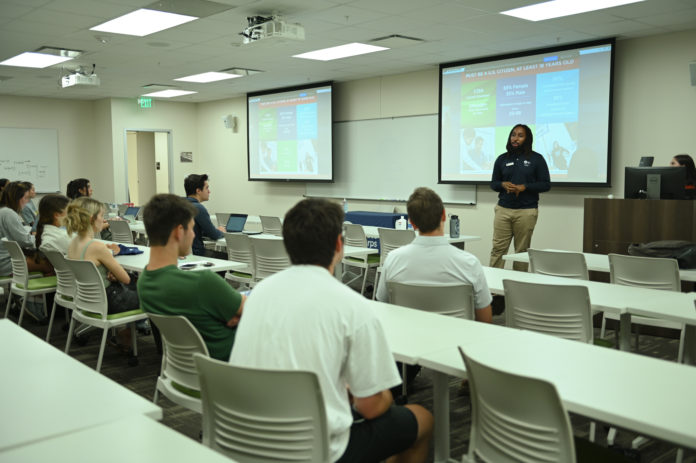
By Luke Araujo | Staff Writer
For the first time since the beginning of the COVID-19 pandemic, the Peace Corps hosted an in-person panel discussion, meeting from 6:30 p.m. to 8 p.m. on Thursday in Cashion Academic Center.
The discussion was held by two panelists: Don Holly, a regional recruiter for the Peace Corps, and Dr. Matthew Whelan, a former agricultural volunteer for the Peace Corps and an assistant professor at Baylor.
For the first 30 minutes, the panelists shared details about the Peace Corps to both physical and virtual attendees. For the remaining hour, Holly and Whelan took the opportunity to answer questions from the audience about the agency.
According to the government agency’s website, the Peace Corps works with the mission to promote world peace and friendship. To accomplish this, the Peace Corps seeks to help train people in interested countries and promote a mutual understanding between Americans and people in interested countries.
Holly and Whelan spent much of the panel discussion speaking about their experiences being volunteers in other countries. Visiting countries like El Salvador, Honduras and Jamaica, the two said each visit was a learning experience.
“It shaped the way I cook and the things I eat,” Whelan said. “It shaped the way I talk and my relationships. I learned Spanish. In so many ways, it has transformed the way I am.”
To help its volunteers financially, the Peace Corps grants volunteers a stipend that takes care of food, housing, travel and other basic amenities. Being in the realm of public service, the Peace Corps also comes with the benefit of loan forgiveness.
On top of financial aid, the Peace Corps offers different areas of concentration. These fields include agriculture, youth development, education, environment, health and community economic development.
When first joining the agency as a volunteer, Holly said new members should expect a 27-month commitment.
“There are three months of training where we teach you how to do the job,” Holly said. “If you have never been an English-as-a-second-language teacher before, we will teach you how to do that. When you start off, you can expect to integrate into your community and learn a new language if you have not already.”
For those interested in joining the agency, Holly said he recommends getting volunteer experience and applying a year in advance at the minimum.
“Peace Corps is what you can make of it,” Holly said. “It is like a blank canvas, and you are the artist. Whatever you want to be on that paper, you can put there.”





